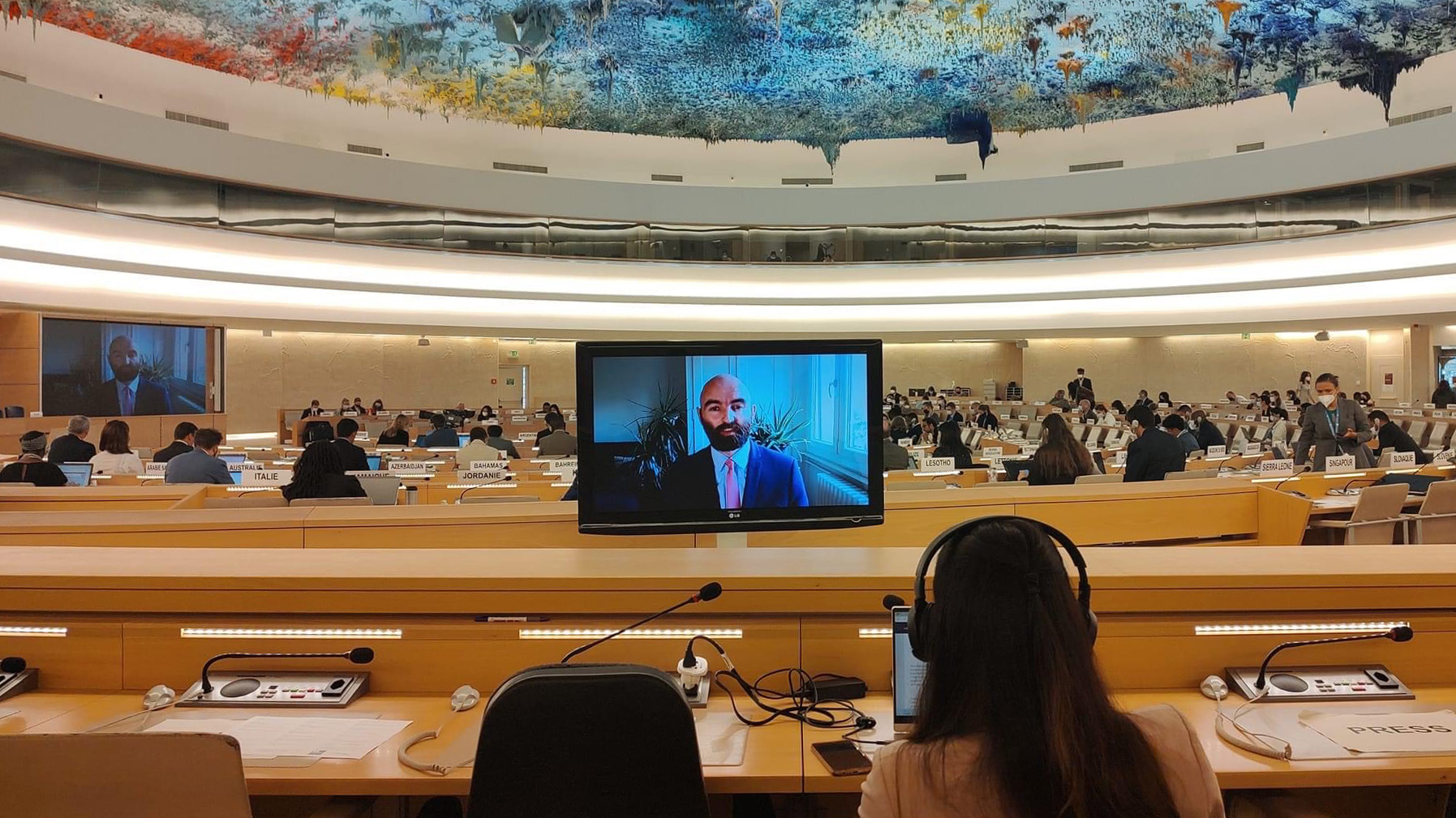Highlighting severe violations committed by Russian forces in Ukraine and calling for accountability
Ukraine remained high on our agenda as continued to raise the desperate human rights situation as the full-scale Russian invasion of the country continues and to advocate for action from the international community and accountability for perpetrators of violations.
On 5 July, we raised the human rights situation in Crimea in the context of the Russian occupation and aggression against Ukraine including the forced mobilisation of at least 3,000 Crimeans. We also urged the Council to continue to express solidarity with Crimeans, to address opportunities to provide support to victims of political reprisals in Crimea and to provide assistance to investigations into serious human rights violations and international crimes occurring in Crimea as well as the rest of Ukraine.
On 16 June, at the High Commissioner’s oral update on Mariupol, we highlighted the atrociites carried out by Russian focrces including executions of civilians, journalists, widespread use of torture, sexual and gender-based and enforced disappearaces. We raised the case of civilian paramedic Julia Payevska who was taken hostage near Mariupol on 16 March. She has since been freed. In addition, on behalf of HRHF’s Ukrainian partners, we highlighted the thousands of Ukrainians being held in Russian filtration camps, raising the reports of appalling conditions and treatment. We called on the Council to look ahead to the next stages of the accountability process.
Calling for the Council to stand with Russian civil society by establishing a Special Rapporteur on the Human Rights situation in Russia
On 23 June, Russian civil society took centre stage at “The human rights situation in the Russian Federation: Building a bridge with civil society as human rights violations intensify”, a virtual side organised by HRHF & several international organisations. We used the side event to underline the increasingly deteriorating situation for Russian civil society, and to call on the Council to establish a Special Rapporteur on the human rights situation in Russia.
Calling for the renewal of the mandate of the Special Rapporteur on the human rights situation in Belarus
As much of the attention of the Council is rightly focused on the situation in Ukraine, we urged Council members to keep the dire human rights situation on Belarus high on the agenda and to renew the much-needed mandate of the Special Rapporteur on Belarus.
On 14 July, Council members heard from a variety of Belarusian and international civil society members in “Human Rights Crisis, Belarus 2022”, a virtual side event organised by HRHF, PEN America, and the Permanent Mission of Lithuania.
Advocating for strong international mechanisms and the protection of four crucial rights that underpin a healthy environment for civil society
In addition to the human rights crisis in Eastern Europe, we continued to engage with the Human Rights Council to raise the right to freedoms of opinion and expression, assembly and association, and the right to be a human rights defender.
On 28 June, we urged states to ensure that responses to the spread of disinformation comply with international human rights law, to refrain from conducting or sponsoring disinformation campaigns, and to seek to strengthen the resilience of societies against the negative impact of disinformation.
During an interactive dialogue on 24 June with the Special Rapporteur on Freedom of Expression, we highlighted the chilling effect that online surveillance and legal harassment including SLAPPs have on freedom of expression. In addition, HRHF raised its concern about the situation for independent journalists and media outlets in Azerbaijan, Belarus, Georgia, and Russia.
Alongside Article 19 and 10 other NGOs, we called on states to protect media freedom in the digital age.
On 17 June, at an interactive dialogue on access to resources with the Special Rapporteur on Assembly and Association, we highlighted the global trend to limit resources with Russia and Azerbaijan as two notable examples. We raised further extensions to Russia’s “foreign agent” legislation aimed at curtailing Russian civil society’s ability to cooperate with international partners.
Following the announcement that Michelle Bachelet would step down, we joined over 60 international civil society organisations urging a transparent, merit-based, and consultative process to replace her as the next High Commissioner for Human Rights in a letter sent to the UN Secretary General on 22 June.
Finally, we joined 16 organisations led by ISHR for “Civil society presents key takeaways from HRC50”, a statement outlining key outcomes and missed opportunities.
Statements
8 July HRC50: Civil society presents key takeaways from Human Rights Council
5 July Human rights in Crimea
28 June Statement on disinformation
28 June Council must renew the mandate of the Special Rapporteur on Belarus
28 June States must protect media freedom in the digital age
24 June Surveillances, SLAPPs, and the situation for journalism in Azerbaijan, Belarus, Georgia and Russia
17 June Access to resources – statement on the freedoms of assembly and of association
16 June Statement at High Commissioner’s Oral Update on Mariupol
Webinars
Human Rights in Crisis, Belarus 2022
HRC50: The human rights situation in the Russian Federation





